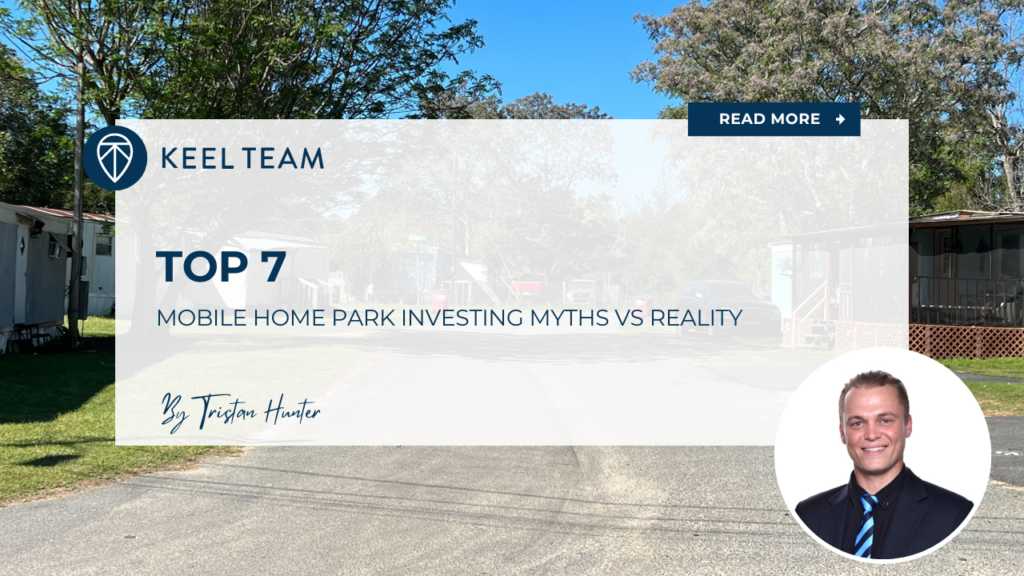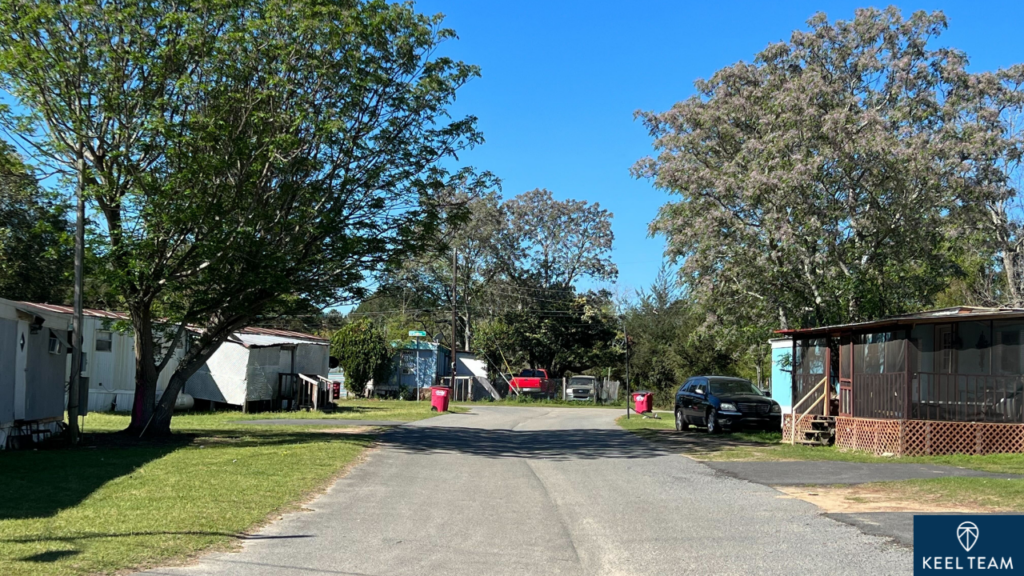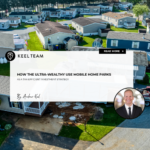Top 7 Mobile Home Park Investing Myths vs Reality
-
 Tristan Hunter - Investor Relations
Tristan Hunter - Investor Relations

Many people hold misconceptions about mobile home parks that don’t reflect their true nature. These misunderstandings can cause hesitation for investors and tenants alike. In this post, we’ll explore some of the most common myths surrounding mobile home park investing and offer insights into the reality behind them.
Myth 1: Mobile Home Parks Are Unsafe and Prone to Crime
One of the biggest myths about mobile home parks is that they experience high crime rates. Many people assume that since mobile home park investing provides affordable housing, they must attract criminal activity. However, this perception isn’t always accurate.
Reality:
While some mobile home parks may experience minor incidents, many offer safe, quiet environments. Security measures like community watch programs, regular maintenance, and proper lighting can discourage unwanted activity. In well-managed mobile home parks, tenant screening processes also play a role in fostering a stable living environment.
Mobile home park owners often invest in infrastructure that promotes safety, including speed bumps to control traffic, security cameras, and clear signage. These proactive steps contribute to making communities safer for residents.
Myth 2: Mobile Home Park Residents Are Poorly Behaved Tenants
Another widespread belief is that mobile home park tenants have poor behavior or fail to take care of their homes. This stereotype assumes residents do not care about maintaining their property or respecting community rules.
Reality:
Many mobile home park residents take pride in their homes. In fact, since residents often own the home itself and rent only the lot, they feel motivated to maintain their property. Mobile home park communities typically have rules regarding property appearance, such as requirements for skirting or window blinds, which help maintain the park’s overall image.
Trailer park owners who foster a sense of community and engagement tend to have more positive tenant relationships. Community events, newsletters, and bulletin boards near mailboxes help encourage good communication and cooperation among residents.
Download our FREE eBook on the Top 20 things to know BEFORE investing in mobile home parks!
Myth 3: Mobile Home Parks Require Constant Maintenance
Many investors shy away from mobile home parks, assuming they come with overwhelming maintenance responsibilities. There’s a belief that these communities require more upkeep than other real estate investments like apartments or traditional rental properties.
Reality:
While all real estate investments require some level of maintenance, mobile home parks are often easier to manage than expected. When residents own their homes, the owner’s responsibilities mostly focus on infrastructure, like roads, sewer lines, and electrical systems, rather than interior repairs.
In some cases, owners may only need to maintain the common areas, speed bumps, street signs, or the entrance landscaping. Hiring reliable contractors or property managers can further ease the workload. Investors often find that with the right planning, mobile home parks demand less day-to-day maintenance than expected.
Myth 4: Mobile Home Parks Are a Last Resort for Housing
The idea that mobile home parks serve as a last resort for people with no other housing options is another misconception. This myth paints mobile home parks as low-quality places where no one would choose to live.
Reality:
Many residents enjoy the sense of freedom and privacy mobile home parks offer compared to apartment living. Mobile homes often provide more space, both indoors and outdoors, at a lower cost than renting an apartment. Some communities feature amenities like playgrounds, basketball courts, and picnic areas, enhancing the quality of life for tenants.
Additionally, mobile home parks attract a diverse group of residents, including retirees, families, and young professionals. The lower cost of living can provide financial stability, allowing tenants to focus on saving, education, or other long-term goals.
Myth 5: Mobile Homes Are Difficult to Sell and Move
A common belief is that mobile homes cannot be resold or relocated once they are placed in a mobile home park. Many assume that owners are stuck with their homes indefinitely, limiting flexibility and resale options.
Reality:
While it can take some effort to sell or relocate a mobile home, it is not impossible. Some mobile home parks even offer incentives to attract new tenants, such as paying for part of the moving costs. Platforms like online marketplaces and local advertisements help sellers connect with potential buyers.
Additionally, residents who plan to sell their homes may find buyers within the same community. Buyers often prefer purchasing an existing home in a well-maintained mobile home park because it saves them the hassle of setting up a new unit.

Myth 6: Mobile Home Parks Are Always Run-Down
Mobile home parks are sometimes viewed as poorly maintained, with old, dilapidated homes and overgrown lots. This assumption can discourage potential tenants and investors from considering mobile home parks as viable housing or investment options.
Reality:
While some older mobile home parks might need improvements, many communities today focus on maintaining a high standard of living. Owners often reinvest in the property by repaving roads, repainting speed bumps, and adding landscaping at the entryway. These small improvements create a welcoming environment and boost tenant satisfaction.
Modern mobile home parks also use lot number signs, clear street signs, and upgraded amenities to improve the overall appearance. Newer mobile homes feature more appealing designs, and many communities encourage residents to keep up with basic maintenance like roof coating and skirting.
Myth 7: Mobile Home Parks Are Risky Investments
Some investors hesitate to invest in mobile home parks, believing they come with significant risks, such as high tenant turnover and limited growth opportunities.
Reality:
While no investment is without risks, mobile home parks offer unique advantages that make them a stable asset class. Tenant turnover tends to be lower than in apartments because residents often own their homes, making relocation more costly and time-consuming.
Additionally, many mobile home parks operate in high-demand areas with limited affordable housing options, contributing to stable occupancy rates. Improvements like adding CBU mailboxes, painting speed bumps, and enhancing entryways can justify rent increases over time, boosting profitability.
Mobile home parks also typically benefit from a diversified income stream. Even when a few lots are vacant, the property can still generate consistent revenue potential from other tenants.
Final Thoughts
Mobile home parks often carry a stigma that doesn’t align with the reality of living or investing in them. These communities offer more stability and affordability than many people realize, making them an appealing option for residents and investors alike. While challenges exist, mobile home park investing with proper management and regular improvements can be a potentially lucrative niche.
Understanding the truth behind these myths allows investors to make informed decisions and helps residents see mobile home parks as a viable, affordable housing solution. Whether you are looking to invest or live in one, it’s worth exploring the real benefits these communities can provide.
Are you looking for MORE information? Book a 1-on-1 consultation with Andrew Keel to discuss:
- A mobile home park deal review
- Due diligence questions
- How to raise capital from investors
- Mistakes to avoid, and more!
Disclaimer:
The information provided is for informational purposes only and is not investment advice or a guarantee of any kind. We do not guarantee profitability. Make investment decisions based on your own research and consult registered financial and legal professionals. We are not registered financial or legal professionals and do not provide personalized investment recommendations.

Tristan Hunter - Investor Relations
View The Previous or Next Post
Subscribe Below 👇




